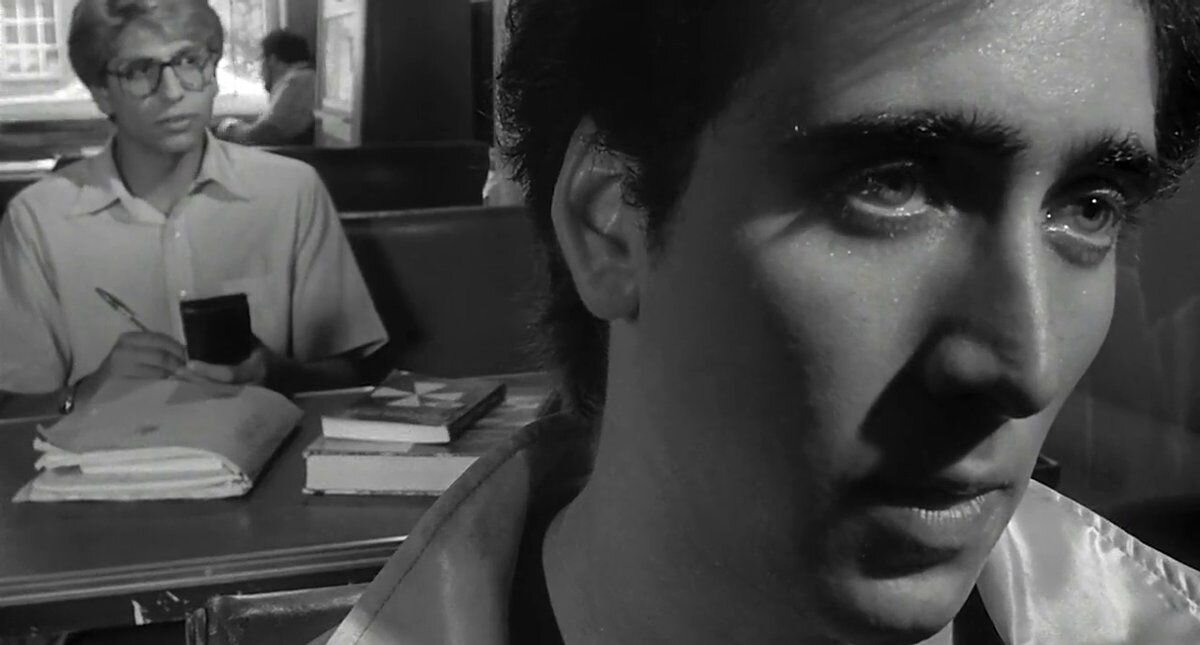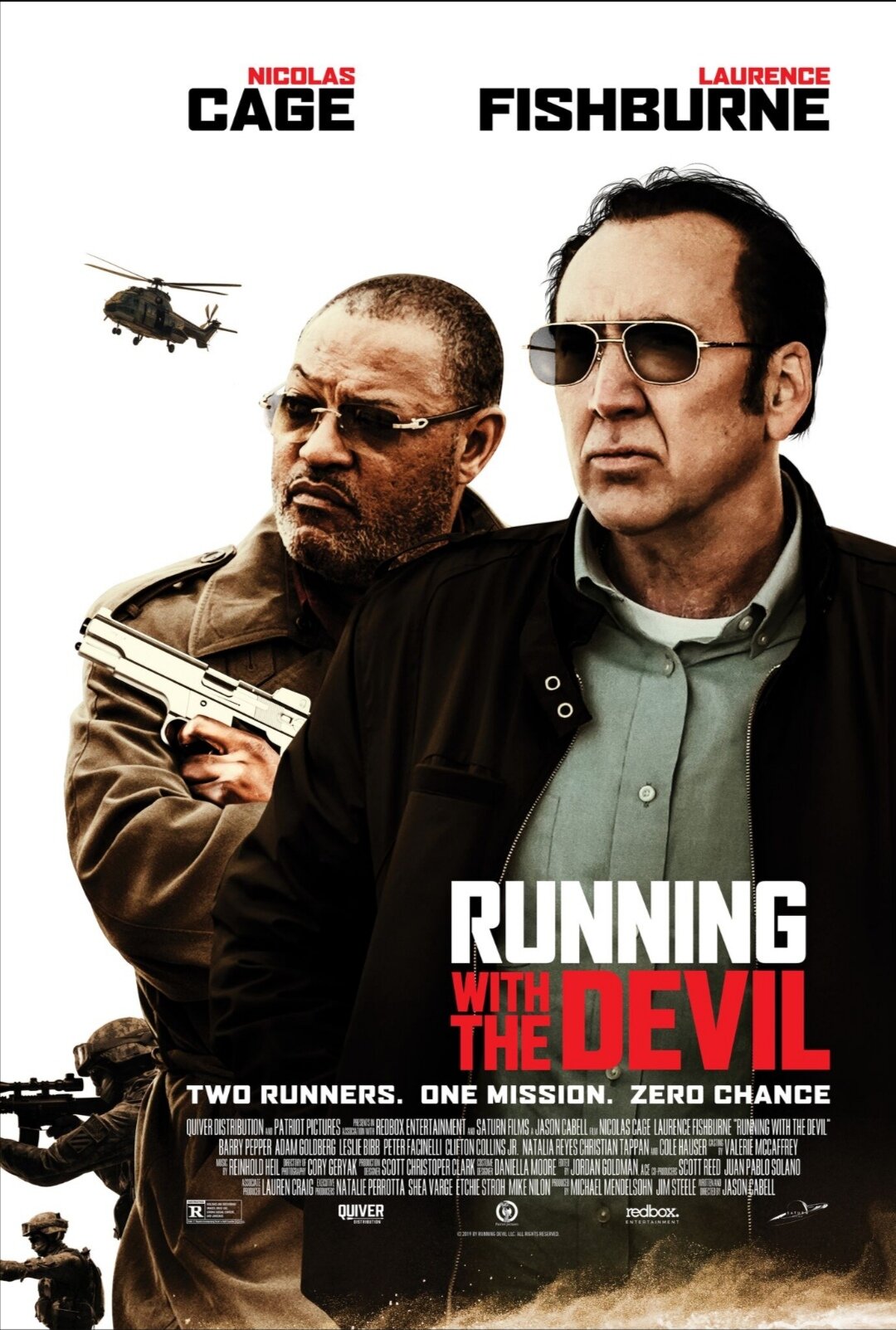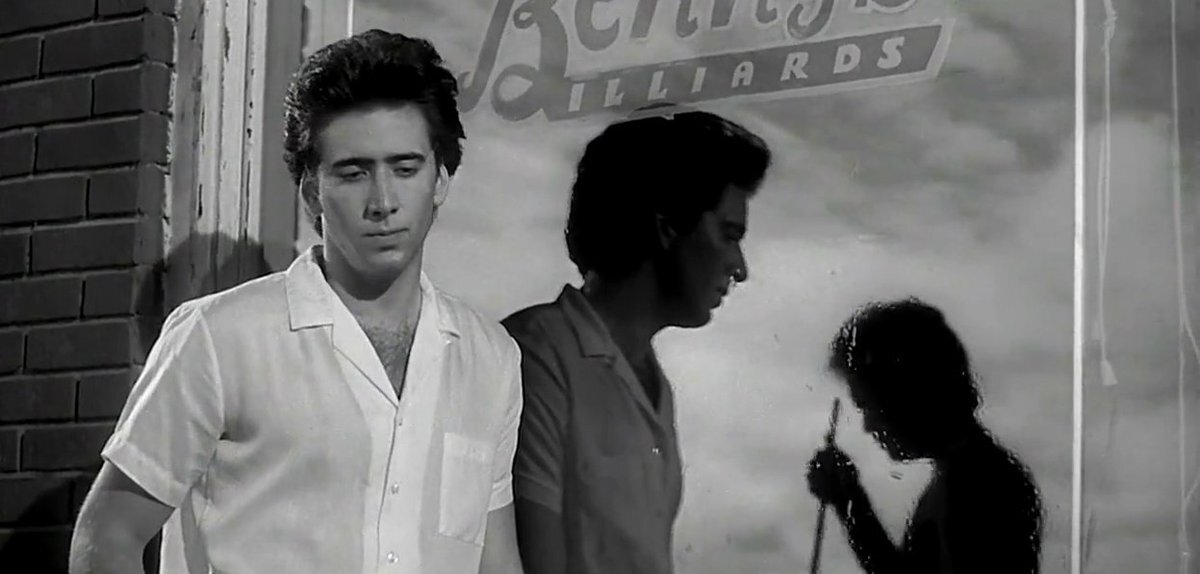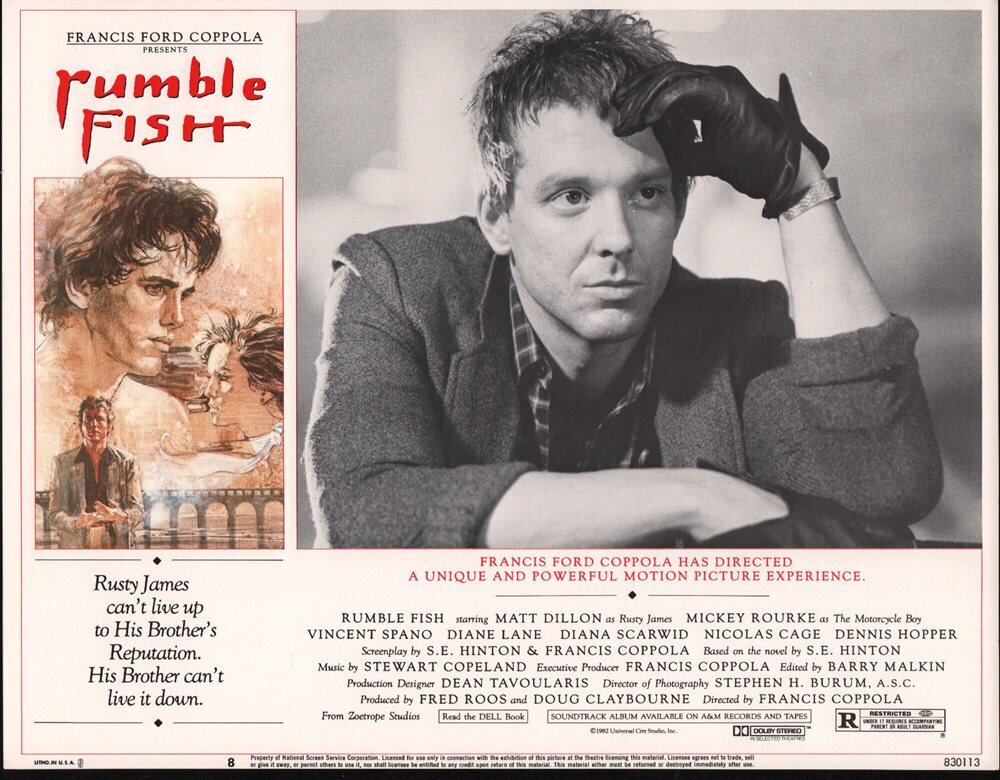The Travolta/Cage Project #4 Rumble Fish (1983)
#Dreamy
With 1983’s The Outsiders, Francis Ford Coppola, with his trademark ambition and bravado, set out to make nothing less than the greatest, most epic teen movie of all time. For its follow-up, released just eight months later, the great auteur once again chose to adapt a classic YA novel from S.E Hinton but on a much more modest, intimate scale.
Coppola remained Coppola, however, so his idea of a moody little art movie for kids entailed a teen movie that takes its visual cues from German Expressionism, specifically The Cabinet of Dr. Caligari and focusses on Marlon Brando and James Dean figures in the form of The Motorcycle Boy (Mickey Rourke) and his worshipful, dumbass younger brother Rusty James (Matt Dillon).
Incidentally it’s THE Motorcycle Boy. That’s his full name. To just call him Motorcycle Boy would be insulting and wrong. C’mon. That’s just fucking silly. Whoever heard of a guy just called Motorcycle Boy? But THE Motorcycle Boy: THAT’s a name that commands respect, which is probably why his mother named him that before abandoning him to pursue her dreams of someday living with a movie producer in California.
Handsome couple! #Goodhair #Enjoyitwhileitlasts #itwont #Ifeelyourpain #baldsolidarity
I wish they’d included a flashback of the James family in happier times, wondering whether or not to name their child Motorcycle Boy or THE Motorcycle Boy. I’m glad they made the right choice, but the pressure clearly destroyed them; the mother abandoned the family and the dad pickled himself silly with booze en route to becoming a sadder than usual Dennis Hopper burnout looking for meaning, or at least escape, in the bottom of a bottle and finding only sadness and oblivion.
Rusty James, incidentally, is always to be called Rusty James, never just Rusty or Russ or R.J or J-Dogg. People call Rusty James by his full goddamn name so often in Rumble Fish that it begins to develop a jazzy staccato rhythm, like a drummer going wild on the hi-hat. Rusty James, Rusty James, Rusty James. It just sounds groovy, ya dig, and in Rumble Fish Coppola uses the poignantly tacky raw material of a swooningly sincere gang melodrama for teens and tweens as an excuse to go wild stylistically.
Coppola was once again attempting to create a new form of pure cinema. It was an electric form of film jazz, a wild be bop rumpus that prized image and mood and gothic, Noir stylization above all else.
And what of Nicolas Cage, brash upstart collaborating with Uncle Francis for the first time in only his second real film appearance? Depending on whether you see Rumble Fish as a masterpiece that elevated the tacky teen melodrama to the level of high art, or a silly movie about dumb kids that is seriously full of itself then Smokey, the high school usurper Cage plays here, is either a teenaged Iago, facetiously presenting himself as the hero’s friend and advocate while covertly plotting against him, or Leave It to Beaver’s Eddie Haskell with literary pretensions.
In Rumble Fish, The Motorcycle Boy is more legend than man. The greasers, hoodlums and juvenile delinquents alike speak of a time of honor and glory, a teen gang Camelot as it were, where the kingly and noble likes of The Motorcycle Boy ruled wisely and ensured that all of the rumbles and skirmishes were conducted in an ethical fashion.
Then he went away to California to find his mom and the American dream, and the idyllic paradise that was teenaged boys punching and kicking each other in regular dust-ups is replaced by a nightmare world of meaningless and amoral rumbles fueled by heroin and pills rather than the honor and dignity that characterized them during The Motorcycle Boy’s time, which was apparently three months ago chronologically but several billion years removed spiritually.
The Motorcycle Boy, similarly, is barely old enough to drink legally in human years, though he’s a Methuselah-like figure compared to the book, where he’s a mere seventeen years old yet somehow also more wizened and world-weary than Yoda.
Seemingly alone, The Motorcycle Boy possesses the prophet-like wisdom and sagacity to understand that teenagers beating each other up over matters of pride and territory is actually pretty dumb when you think about it, and also pretty pointless and maybe there’s more to life, and maybe there isn’t.
He’s barely out of his teens but he already seems to have lived several exhausting, eventful lifetimes. He is The Motorcycle Boy but really he is the Motorcycle Man. In Rumble Fish, to be different is to be superior and as a partially deaf, color-blind 21 year old with the wisdom of Solomon and the Zen of Buddha, The Motorcycle Boy is as different and superior as they come.
Rumble Fish posits madness as a state of grace. To be mad is to be close to God, to be close to Godliness. Nobody’s madness is more divine than Beatnik Hipster Pope The Motorcycle Boy, whose look, perpetually dangling cigarette and all, was based on not just the writing of Albert Camus but on Camus himself.
Rusty James, in sharp contrast, is just a fucking idiot, a good-looking numbskull (he is played by Matt Dillon, after all) who hero-worships an older brother but who can’t help but get him and his crew into the kind of pointlessly destructive rumbles his brother banished.
#Symbolic
Cage plays Smokey as a creature of guile and sinister calculation in a guileless world where everything is exactly as it appears. He doesn’t see the point of exchanging fisticuffs with the gang of hated rival Biff Wilcox, who further dishonors the unimpeachable moral purity that once defined Tulsa, Oklahoma’s teenage gangs by shamefully popping pills to get him hyped for rumbles.
Yet Smokey presents himself as a friend to Rusty all the same, one who will dutifully back him up whether he believes in the cause or not when, in actuality, Smokey is a conniver and a deceiver who arranges for Rusty’s dumb ass to cheat on his gorgeous girlfriend Patty (Diane Lane) at a big orgy so that he can swoop in and steal Rusty James’ woman when she learns of his cheating.
It’s not easy to steal a woman from a dude who looks like a 19 year old Matt Dillion but unlike his dim-witted, easily out-maneuvered rival, Smokey possess beauty AND brains. He’s got savvy as well as a gorgeous face, impressive pompadour (oh, but the days of Cage having a rich, full head of hair were brief but glorious) and sick-ass jacket I would happily pay good money to own myself.
Haven’t aged a bit!
Smokey may not be the juiciest, or biggest role in the film but even in a cast with character actor heavyweights like Dennis Hopper, Mickey Rourke, Laurence Fishburne, Tom Waits, William Smith, Christopher Penn, Diana Scarwid and Diane Lane, Cage stands out. Even at the very beginning of his career, he possessed a magnetism and charisma that made him impossible to ignore.
Rumble Fish is full of striking shots. Honestly, a picture book of every single frame of the movie would be more satisfying than the film itself because while Rumble Fish could not be more gorgeous and ambitious from a visual perspective, on a narrative and storytelling level it is a staggeringly, almost comically adolescent exercise in glib pop mythologizing and impossibly heavy-handed symbolism.
To cite one of the film’s more understated visual motifs, Coppola and cinematographer Stephen H. Burum return over and over again to clock and watch imagery to underline how time is running out for The Motorcycle Boy and the world that he represents.
One perfect shot.
In an even clumsier allegory, Rumble Fish takes its title from a pair of Siamese fighting fish, who are filmed in vivid color while the rest of the movie is shot in atmospheric, high-contrast black and white, with lots of gorgeous deep focus compositions, who become incredibly aggressive and will kill each other if confined in the same tank as another Siamese fighting fish, in a manner EXACTLY like how misguided gangs will destroy each other when stuck in the same impoverished, hopeless neighborhoods, without hope of escape or transcendence.
The Motorcycle Boy hypothesizes that if you were to free these achingly metaphorical creatures in some manner of cathartic symbolic release then they would be free, baby, and also not murder each other. And that would be a good thing for everyone.
In Rumble Fish’s climax, the fascist cop who has been riding The Motorcycle Boy’s ass all movie long, on account of hating the freedom and individuality that he represents finally gets a chance to bust him on the most serious crime of all: fish thievery.
Yes, The Motorcycle Boy fulfills his inevitable destiny by breaking into the pet store to liberate the Siamese Fighting Fish and their various non-human contemporaries so that he can take them to the ocean where they can be free to realize their potential as the single most ham-fisted metaphors in the history of art.
An impromptu death penalty seems like an awfully harsh penalty for purloining several dollars worth of fish but there’s no way a secular Saint like The Motorcycle Boy is making out of the movie alive when he’s just too good and too pure for this world.
In an equally inevitable, equally pre-ordained development, stupid fucking Rusty James ends the movie by realizing his dead brother’s fondest wish by visiting the Pacific Ocean.
Rusty James is supposed to be a pale shadow of his legendary older brother but he’s undoubtedly supposed to be something more than an unlikable twerp. Would Cage have been more compelling and charismatic in the role? Of course but the problem has more to do with how the character is written than how he’s played.
#Experience
Rumble Fish is a film of astonishing beauty whose conception of deep is preposterously, ridiculously shallow, a feast for the eyes and the senses that nevertheless had me groaning and rolling my eyes on a regular basis.
Before he was THE Nicolas Cage (like THE Motorcycle Boy), the future Face/Off cult icon was part of a ridiculously gifted, over-qualified team of artists and craftsman committed to realizing his genius uncle’s ambitious, audacious creative vision.
It can be easy to forget that Nicolas Cage is a Coppola. Motherfucker was BORN famous. He was BORN into greatness. Genius is his birthright but he would need to stop working overwhelmingly with his legendary uncle to be recognized as a creative titan in his own right, not just Francis Ford Coppola’s crackpot relation.
The world might not have known it at the time, but Cage was no mere actor. He was a spiritual seeker on a creative journey,
Cage and his famous uncle weren’t just entertainers: they were ARTISTS and Rumble Fish is positively lousy with artistry. Too much artistry, in fact, for a story this simple to handle.
Help ensure a future for the Happy Place by pledging over at https://www.patreon.com/nathanrabinshappyplace
OR y’all can get in on the CONSTANTLY updated Travolta/Cage Patreon and our newsletter, Reading This Won’t Bring Back Your Honey https://www.patreon.com/TravoltaCage
AND of course the Weird Accordion to Al book pre-order campaign at We haven’t had a pre-order in a hot minute and everything is appreciated at https://make-the-weird-accordion-to-al-book-a-ridiculous-r.backerkit.com/hosted_preorders










